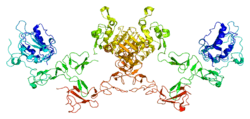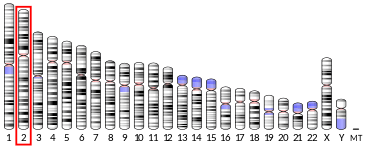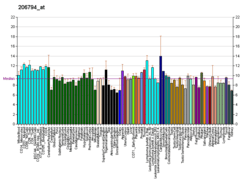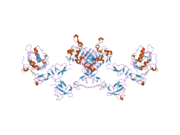ERBB4
Receptor tyrosine-protein kinase erbB-4 is an enzyme that in humans is encoded by the ERBB4 gene.[5][6] Alternatively spliced variants that encode different protein isoforms have been described; however, not all variants have been fully characterized.[7]
Function
Receptor tyrosine-protein kinase erbB-4 is a receptor tyrosine kinase that is a member of the epidermal growth factor receptor family. ERBB4 is a single-pass type I transmembrane protein with multiple furin-like cysteine rich domains, a tyrosine kinase domain, a phosphotidylinositol-3 kinase binding site and a PDZ domain binding motif. The protein binds to and is activated by neuregulins-2 and -3, heparin-binding EGF-like growth factor and betacellulin. Ligand binding induces a variety of cellular responses including mitogenesis and differentiation. Multiple proteolytic events allow for the release of a cytoplasmic fragment and an extracellular fragment.[7]
Clinical significance
Mutations in this gene have been associated with cancer.[7] Other single-nucleotide polymorphisms and a risk haplotype have been linked to schizophrenia.[8] Single-nucleotide polymorphisms in ERBB4 have also been found in a study of patients with familial amyotrophic lateral sclerosis type 19.[9]
Interactions
ERBB4 has been shown to interact with:
References
- GRCh38: Ensembl release 89: ENSG00000178568 - Ensembl, May 2017
- GRCm38: Ensembl release 89: ENSMUSG00000062209 - Ensembl, May 2017
- "Human PubMed Reference:". National Center for Biotechnology Information, U.S. National Library of Medicine.
- "Mouse PubMed Reference:". National Center for Biotechnology Information, U.S. National Library of Medicine.
- Zimonjic DB, Alimandi M, Miki T, Popescu NC, Kraus MH (Mar 1995). "Localization of the human HER4/erbB-4 gene to chromosome 2". Oncogene. 10 (6): 1235–7. PMID 7700649.
- Sardi SP, Murtie J, Koirala S, Patten BA, Corfas G (Oct 2006). "Presenilin-dependent ErbB4 nuclear signaling regulates the timing of astrogenesis in the developing brain". Cell. 127 (1): 185–97. doi:10.1016/j.cell.2006.07.037. PMID 17018285.
- "Entrez Gene: ERBB4 v-erb-a erythroblastic leukemia viral oncogene homolog 4 (avian)".
- Silberberg G, Darvasi A, Pinkas-Kramarski R, Navon R (Mar 2006). "The involvement of ErbB4 with schizophrenia: association and expression studies". American Journal of Medical Genetics Part B. 141B (2): 142–8. doi:10.1002/ajmg.b.30275. PMID 16402353.
- Takahashi Y, Fukuda Y, Yoshimura J, Toyoda A, Kurppa K, Moritoyo H, Belzil VV, Dion PA, Higasa K, Doi K, Ishiura H, Mitsui J, Date H, Ahsan B, Matsukawa T, Ichikawa Y, Moritoyo T, Ikoma M, Hashimoto T, Kimura F, Murayama S, Onodera O, Nishizawa M, Yoshida M, Atsuta N, Sobue G, Fifita JA, Williams KL, Blair IP, Nicholson GA, Gonzalez-Perez P, Brown RH, Nomoto M, Elenius K, Rouleau GA, Fujiyama A, Morishita S, Goto J, Tsuji S (Nov 2013). "ERBB4 mutations that disrupt the neuregulin-ErbB4 pathway cause amyotrophic lateral sclerosis type 19". American Journal of Human Genetics. 93 (5): 900–5. doi:10.1016/j.ajhg.2013.09.008. PMC 3824132. PMID 24119685.
- Garcia RA, Vasudevan K, Buonanno A (Mar 2000). "The neuregulin receptor ErbB-4 interacts with PDZ-containing proteins at neuronal synapses". Proceedings of the National Academy of Sciences of the United States of America. 97 (7): 3596–601. doi:10.1073/pnas.070042497. PMC 16285. PMID 10725395.
- Huang YZ, Won S, Ali DW, Wang Q, Tanowitz M, Du QS, Pelkey KA, Yang DJ, Xiong WC, Salter MW, Mei L (May 2000). "Regulation of neuregulin signaling by PSD-95 interacting with ErbB4 at CNS synapses". Neuron. 26 (2): 443–55. doi:10.1016/S0896-6273(00)81176-9. PMID 10839362.
- Williams CC, Allison JG, Vidal GA, Burow ME, Beckman BS, Marrero L, Jones FE (Nov 2004). "The ERBB4/HER4 receptor tyrosine kinase regulates gene expression by functioning as a STAT5A nuclear chaperone". The Journal of Cell Biology. 167 (3): 469–78. doi:10.1083/jcb.200403155. PMC 2172499. PMID 15534001.
- Schulze WX, Deng L, Mann M (2005). "Phosphotyrosine interactome of the ErbB-receptor kinase family". Molecular Systems Biology. 1 (1): 2005.0008. doi:10.1038/msb4100012. PMC 1681463. PMID 16729043.
- Omerovic J, Puggioni EM, Napoletano S, Visco V, Fraioli R, Frati L, Gulino A, Alimandi M (Apr 2004). "Ligand-regulated association of ErbB-4 to the transcriptional co-activator YAP65 controls transcription at the nuclear level". Experimental Cell Research. 294 (2): 469–79. doi:10.1016/j.yexcr.2003.12.002. PMID 15023535.
Further reading
- Carpenter G (Mar 2003). "ErbB-4: mechanism of action and biology". Experimental Cell Research. 284 (1): 66–77. doi:10.1016/S0014-4827(02)00100-3. PMID 12648466.
- Culouscou JM, Plowman GD, Carlton GW, Green JM, Shoyab M (Sep 1993). "Characterization of a breast cancer cell differentiation factor that specifically activates the HER4/p180erbB4 receptor". The Journal of Biological Chemistry. 268 (25): 18407–10. PMID 7689552.
- Barbacci EG, Guarino BC, Stroh JG, Singleton DH, Rosnack KJ, Moyer JD, Andrews GC (Apr 1995). "The structural basis for the specificity of epidermal growth factor and heregulin binding". The Journal of Biological Chemistry. 270 (16): 9585–9. doi:10.1074/jbc.270.16.9585. PMID 7721889.
- Nagata K, Kohda D, Hatanaka H, Ichikawa S, Matsuda S, Yamamoto T, Suzuki A, Inagaki F (Aug 1994). "Solution structure of the epidermal growth factor-like domain of heregulin-alpha, a ligand for p180erbB-4". The EMBO Journal. 13 (15): 3517–23. doi:10.1002/j.1460-2075.1994.tb06658.x. PMC 395255. PMID 8062828.
- Plowman GD, Culouscou JM, Whitney GS, Green JM, Carlton GW, Foy L, Neubauer MG, Shoyab M (Mar 1993). "Ligand-specific activation of HER4/p180erbB4, a fourth member of the epidermal growth factor receptor family". Proceedings of the National Academy of Sciences of the United States of America. 90 (5): 1746–50. doi:10.1073/pnas.90.5.1746. PMC 45956. PMID 8383326.
- Cohen BD, Green JM, Foy L, Fell HP (Mar 1996). "HER4-mediated biological and biochemical properties in NIH 3T3 cells. Evidence for HER1-HER4 heterodimers". The Journal of Biological Chemistry. 271 (9): 4813–8. doi:10.1074/jbc.271.9.4813. PMID 8617750.
- Andersson B, Wentland MA, Ricafrente JY, Liu W, Gibbs RA (Apr 1996). "A "double adaptor" method for improved shotgun library construction". Analytical Biochemistry. 236 (1): 107–13. doi:10.1006/abio.1996.0138. PMID 8619474.
- Yu W, Andersson B, Worley KC, Muzny DM, Ding Y, Liu W, Ricafrente JY, Wentland MA, Lennon G, Gibbs RA (Apr 1997). "Large-scale concatenation cDNA sequencing". Genome Research. 7 (4): 353–8. doi:10.1101/gr.7.4.353. PMC 139146. PMID 9110174.
- Elenius K, Paul S, Allison G, Sun J, Klagsbrun M (Mar 1997). "Activation of HER4 by heparin-binding EGF-like growth factor stimulates chemotaxis but not proliferation". The EMBO Journal. 16 (6): 1268–78. doi:10.1093/emboj/16.6.1268. PMC 1169725. PMID 9135143.
- Chang H, Riese DJ, Gilbert W, Stern DF, McMahan UJ (May 1997). "Ligands for ErbB-family receptors encoded by a neuregulin-like gene". Nature. 387 (6632): 509–12. doi:10.1038/387509a0. PMID 9168114.
- Carraway KL, Weber JL, Unger MJ, Ledesma J, Yu N, Gassmann M, Lai C (May 1997). "Neuregulin-2, a new ligand of ErbB3/ErbB4-receptor tyrosine kinases". Nature. 387 (6632): 512–6. doi:10.1038/387512a0. PMID 9168115.
- Chow NH, Liu HS, Yang HB, Chan SH, Su IJ (Jun 1997). "Expression patterns of erbB receptor family in normal urothelium and transitional cell carcinoma. An immunohistochemical study". Virchows Archiv. 430 (6): 461–6. doi:10.1007/s004280050056. PMID 9230911.
- Zhang D, Sliwkowski MX, Mark M, Frantz G, Akita R, Sun Y, Hillan K, Crowley C, Brush J, Godowski PJ (Sep 1997). "Neuregulin-3 (NRG3): a novel neural tissue-enriched protein that binds and activates ErbB4". Proceedings of the National Academy of Sciences of the United States of America. 94 (18): 9562–7. doi:10.1073/pnas.94.18.9562. PMC 23218. PMID 9275162.
- Elenius K, Corfas G, Paul S, Choi CJ, Rio C, Plowman GD, Klagsbrun M (Oct 1997). "A novel juxtamembrane domain isoform of HER4/ErbB4. Isoform-specific tissue distribution and differential processing in response to phorbol ester". The Journal of Biological Chemistry. 272 (42): 26761–8. doi:10.1074/jbc.272.42.26761. PMID 9334263.
- Komurasaki T, Toyoda H, Uchida D, Morimoto S (Dec 1997). "Epiregulin binds to epidermal growth factor receptor and ErbB-4 and induces tyrosine phosphorylation of epidermal growth factor receptor, ErbB-2, ErbB-3 and ErbB-4". Oncogene. 15 (23): 2841–8. doi:10.1038/sj.onc.1201458. PMID 9419975.CS1 maint: date and year (link)
- Fiddes RJ, Campbell DH, Janes PW, Sivertsen SP, Sasaki H, Wallasch C, Daly RJ (Mar 1998). "Analysis of Grb7 recruitment by heregulin-activated erbB receptors reveals a novel target selectivity for erbB3". The Journal of Biological Chemistry. 273 (13): 7717–24. doi:10.1074/jbc.273.13.7717. PMID 9516479.
- Jones JT, Ballinger MD, Pisacane PI, Lofgren JA, Fitzpatrick VD, Fairbrother WJ, Wells JA, Sliwkowski MX (May 1998). "Binding interaction of the heregulinbeta egf domain with ErbB3 and ErbB4 receptors assessed by alanine scanning mutagenesis". The Journal of Biological Chemistry. 273 (19): 11667–74. doi:10.1074/jbc.273.19.11667. PMID 9565587.
- Srinivasan R, Poulsom R, Hurst HC, Gullick WJ (Jul 1998). "Expression of the c-erbB-4/HER4 protein and mRNA in normal human fetal and adult tissues and in a survey of nine solid tumour types". The Journal of Pathology. 185 (3): 236–45. doi:10.1002/(SICI)1096-9896(199807)185:3<236::AID-PATH118>3.0.CO;2-7. PMID 9771476.
- Harari D, Tzahar E, Romano J, Shelly M, Pierce JH, Andrews GC, Yarden Y (Apr 1999). "Neuregulin-4: a novel growth factor that acts through the ErbB-4 receptor tyrosine kinase". Oncogene. 18 (17): 2681–9. doi:10.1038/sj.onc.1202631. PMID 10348342.
External links
- Overview of all the structural information available in the PDB for UniProt: Q15303 (Receptor tyrosine-protein kinase erbB-4) at the PDBe-KB.






